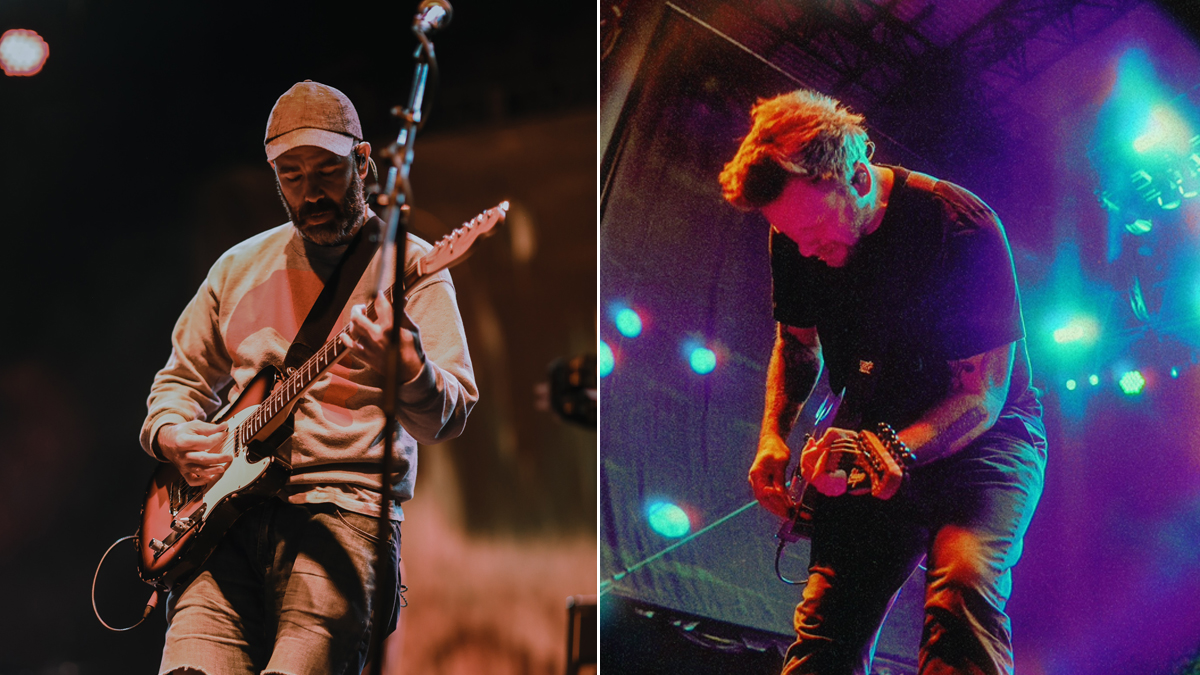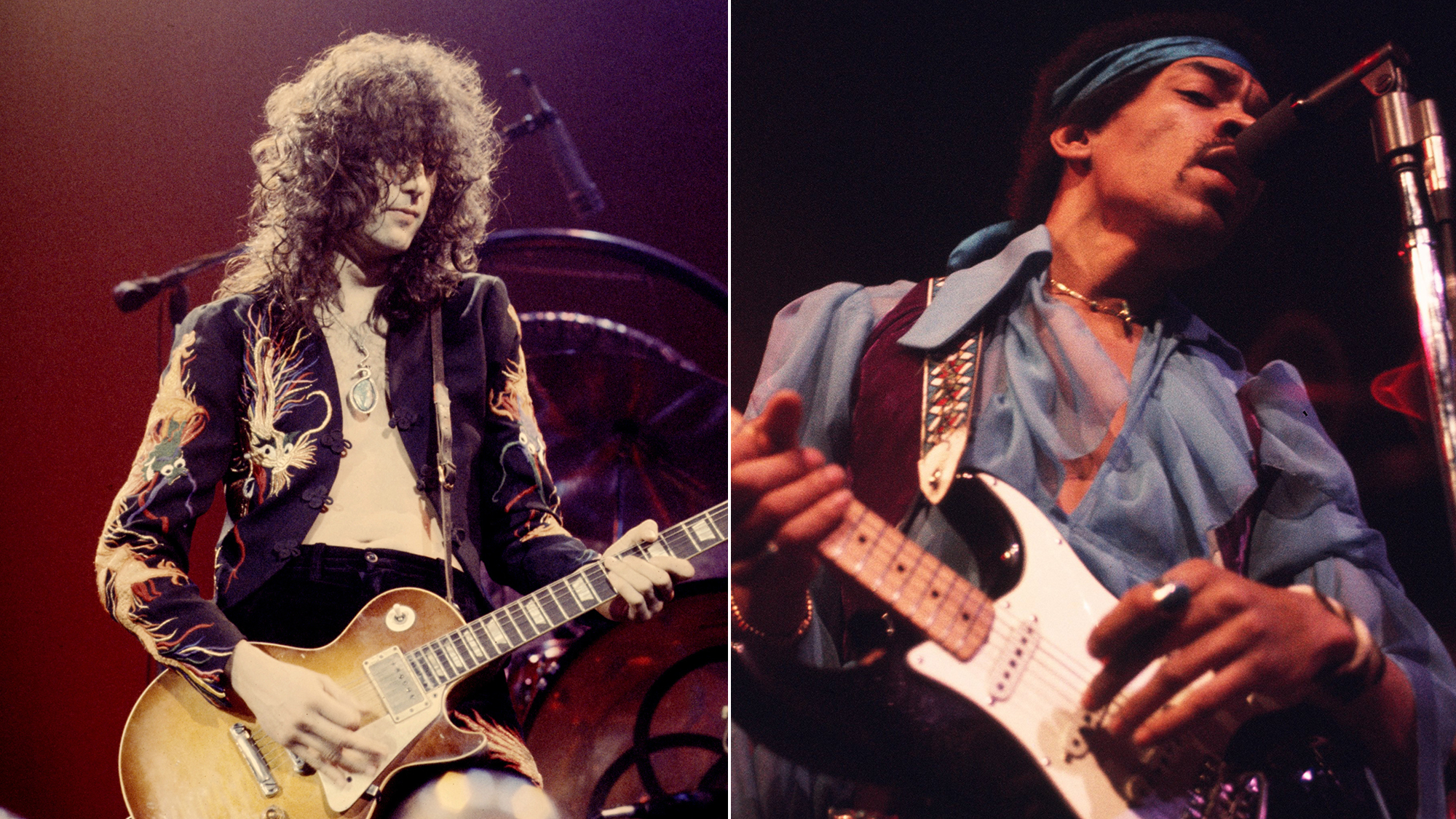Circa Survive: "It used to be difficult not to fill up every space with guitar – this record shows how our ability to restrain ourselves has grown"
Colin Frangicetto and Brendan Ekstrom dissect their less-is-more approach on A Dream About Love and confess their newfound affinity for the Line 6 Helix

It’s not that Circa Survive’s new A Dream About Love EP is a minimalist effort – the synth-and-sound-effects-smeared first single Imposter Syndrome proves it’s anything but. But, for a band that’s often trafficked in the more prog-geared side of the post-hardcore world via albums like their 2005 debut Juturna and 2017’s The Amulet, this latest release purposefully finds guitarists Brendan Ekstrom and Colin Frangicetto reining in their usual six-string theatrics.
This often means guitars chime in a more textural, supportive role on pieces like the bass-forward Drift. Likewise, on Even Better, Ekstrom and Frangicetto’s chorus-and-delay-spangled, Cure-like guitar lines are spare, yet impactful.
Beds were tracked with producer Will Yip in Circa Survive drummer Steve Clifford’s garage, before the Philly quintet bounced the tracks over to Yip’s Studio Four facility in Conshohocken, Pennsylvania, for a final mix. During the homestretch, Ekstrom realized he was pulling out more from the recordings than he was punching in.
“I remember sitting in the studio when we went in to do more guitars. We’d work on something for 20 minutes and be like, ‘That sounds sick, but delete it,’” Ekstrom says with a laugh.
“It’s easy to throw shit against the wall with guitar, and with this band. It comes so natural to us to do melodies and counter-melodies that seem cool. We tend to do this thing where, yes, it’s better to have more on there so we can take it away later, but we [generally] never do. This time we did.”
Speaking with Guitar World, Ekstrom and Frangicetto further got into the stripped-back six-strings, instrument swaps, and improvised slide solos of their latest dreamscape.
Over the past year, Circa Survive began sharing music through your Creature Club on Patreon, doing covers and showing folks some behind-the-scenes song ideas. Is that where the songs on A Dream About Love came from, or did they get their start before the pandemic?
Get The Pick Newsletter
All the latest guitar news, interviews, lessons, reviews, deals and more, direct to your inbox!
Colin Frangicetto: "Before the pandemic. Actually, nothing from the EP was shared prior to [announcing it]. We kept it a secret; the Patreon wasn’t aware of it. It’s cool, because [we were] extremely active on the Patreon, and actually wrote a bunch of new songs and shared some demos on there, but not for this record."
It’s a different kind of EP for the band. Imposter Syndrome, for instance, has got a broader, more textural approach to guitar playing than some of your proggier earlier work.
Frangicetto: "I’ve always been more interested in textures than licks. Through my whole history in the band, I think people are confused as to who plays what. I generally tell people if it sounds like an actual talented guitar player playing it, it’s probably Brendan.
I’m trying to be invisible, to some extent, to support the other guitar. That’s where my interest in pedals and effects comes from
Colin Frangicetto
"I’m trying to be invisible, to some extent, to support a lot of that stuff. That’s where my interest in pedals and effects comes from – you know, 'How can I make a guitar sound like a keyboard?' I was very influenced by Cave In’s Jupiter and the later Codeseven records. These guitar players were playing what sounded like synths."
Brendan Ekstrom: "On The Amulet I really wanted to experiment with odder time signatures again, stuff that was in 7/4; that was the focus. One of the things with this album I really wanted to accomplish was not over-coloring the mix with the wide range that a guitar can take up.
"One of my favorite things about production in pop music these days is that there is a lot of space. There might be one or two songs [on this EP] that started with guitar. Everything else started with a beat or a keyboard melody. It wasn’t like we were riffing and [building] around that."
Getting into specifics, Drift is driven by that nasty bass fuzz groove and a lot of electronic piano. There’s some funkiness to the guitars, but it’s not at the forefront…
Ekstrom: "That’s a perfect example. The foundation started with us, in a room, without our big amps. There were two computers in the room, and everybody had their amps turned down real low. I think that’s your drum beat, Colin?"
Frangicetto: "Yeah, I wrote this four-on-the-floor R&B beat. I thought it was funny, like, ‘This is so basic and out of the norm for what a Circa song would be.’ They were at lunch when I wrote it. They came back and I’m pretty sure it was you, Brendan, who started jamming on it with the bass. The juxtaposition of this super-simple electro groove with this really gnarly bass fuzz was awesome."
Ekstrom: "The keyboard chord progression was Nick [Beard, Circa Survive bassist]; I think I did the bass. We didn’t want to make a record that was in the same exact vein as another Circa record – really, the only way to do that was to just go outside of our comfort zone and try out new shit.
"I went up to Nick early on and said, ‘Hey man, I’m really enjoying rhythm and grooves more than playing guitar parts right now. Would you mind if I had the bass sometimes?’ He was cool with that; he’d also been programming [beats]. Steve [Clifford] had also been programming shit. Everything just came from a different place this time around."
Getting into what Colin hinted at earlier, in terms of twisting guitar sounds, what were some of the gear combinations you ended up exploring this time around?
Usually in the studio I'm using a lot of single pedals. The biggest difference this time was that I was just fucking around with a Line 6 Helix
Brendan Ekstrom
Ekstrom: "A lot of times when we go into the studio I’m using a lot of single pedals. That’s the easiest time to really get the best use out of those; it can be more complicated for a live setup when I’m trying to do as many different tones as I am. The biggest difference this time was that I was just fucking around with a Line 6 Helix.
"I was listening to my buddy [Dewey Halpaus]’s podcast, the Peer Pleasure podcast, and he had [Fugazi’s] Ian MacKaye on there. [Ian] was talking about how, with his early bands, he would just pick a guitar and an amp, maybe one pedal, and say, ‘Okay, that’s our sound. I’m not going to spend a bunch of time fucking around with different sounds; I’ll let the time be taken up by creating music.’ That stuck in my head!
"I can get so fucking lost in knob-tweaking, so I didn’t want to put shit on and off my board [in the studio]. It was freeing just to be logged into this one thing. It seems backwards, though, since it's such a powerful tool. I was scrolling through the presets and then I’d be like, ‘Tonally this fits, so maybe I’ll mess around with how much delay is on there, or turn down the reverb and add a bit of tremolo.’"
Brendan, you’d recently made a post on Instagram about cranking BadCat amps. Are those on the EP?
Ekstrom: "We did use the Bad Cat on a couple things. I went into [producer Will Yip’s] Studio Four for a few songs where we thought, ‘Hey, this could really use that natural tube amp sound.’ We re-recorded a couple of guitar parts on Even Better, and definitely the end of Our Last Shot – some of the heavier parts where we wanted a big natural room sound."
Frangicetto: "Just to jump back to the earlier question, there wasn’t any gear I was necessarily itching to try out, [but there was] production stuff that I always wanted to use in Circa, but never really had the chance to. I had a solo project that I put out 10 years ago called Psychic Babble that’s very synth- and electro-driven; I’ve done a lot of remix work over the years for the band Foxing, or [Circa Survive vocalist] Anthony [Green]’s solo project. I’ve developed a bunch of little tricks that I use. This was the first time I had the opportunity to bring that kind of a sparkle to [Circa Survive].
This record shows how our ability to restrain ourselves has grown. When we were first going, it was really difficult not to fill up every space [with guitar]
Colin Frangicetto
"The interesting part of this record is how our ability to restrain ourselves has grown. When we were first going, it was really difficult not to fill up every space [with guitar]. This brings us back to what Brendan said at the beginning, this goal of leaving space; creating peaks and valleys.
"I was still living out in Portland, Oregon, when we were finishing the record. When they went into the studio to finish it up, I was still stuck in lockdown. I was recording myself a lot of the time, and sending in stems. For Drift, I think I had over a dozen different vibes going on, but I don’t think any of them actually wound up on there [laughs].
"I didn’t bother sending them to Will. It was like, ‘This doesn’t need anything else.’ To be able to make that call felt like a pretty big achievement. We’ve all gotten to this place where we’re able to hear something and take our ego out of it. ‘Even though I may not have played a bunch of shit on this thing I’m hearing, it doesn’t need anything else.’ That was great."
While some of the process had been about reining it in, there are still some larger guitar moments on the record. On Gone for Good you’ve got a wide-open slide solo going on. Brendan, was that you?
Ekstrom: "I get nightmares about stuff like that. I was literally just fucking around. Like, if we play this live…
"It’s always interesting to me when stuff is improvised and it actually works. We’re not the type of band that spends time improvising live, or jamming – I don’t have a lot of confidence in that – but to have [that solo] show up on record... It’s really comforting for me to go back and listen to it and know that it was very natural. It means more, in a way."
Circa Survive head out on tour early next year for the make-up dates of your belated Blue Sky Noise 10th anniversary tour. Are you going to want to put any of these songs in the set as well?
Frangicetto: "Want and will are very different things [laughs]. We’d love to play these songs. We’re blessed in that we have these VIP sets that we do every day for [a smaller audience of] people. It’s a unique setup that’s built perfectly for these songs. I’m not sure if we’ll be doing anything else in the actual set, though.
"Time would probably not allow for that. Between Blue Sky Noise and the Appendage EP, that’s already a pretty hefty set. Most likely we’ll be focusing on celebrating that record and EP."
- A Dream About Love is available now via Reprise Records.
Gregory Adams is a Vancouver-based arts reporter. From metal legends to emerging pop icons to the best of the basement circuit, he’s interviewed musicians across countless genres for nearly two decades, most recently with Guitar World, Bass Player, Revolver, and more – as well as through his independent newsletter, Gut Feeling. This all still blows his mind. He’s a guitar player, generally bouncing hardcore riffs off his ’52 Tele reissue and a dinged-up SG.
“I met Joe when he was 12. He picked up a vintage guitar in one store and they told him to leave. But someone said, ‘This guy called Norm will let you play his stuff’”: The unlikely rise of Norman’s Rare Guitars and the birth of the vintage guitar market
“This would make for the perfect first guitar for any style of player whether they’re trying to imitate John Mayer or John Petrucci”: Mooer MSC10 Pro review








![John Mayer and Bob Weir [left] of Dead & Company photographed against a grey background. Mayer wears a blue overshirt and has his signature Silver Sky on his shoulder. Weir wears grey and a bolo tie.](https://cdn.mos.cms.futurecdn.net/C6niSAybzVCHoYcpJ8ZZgE.jpg)

![A black-and-white action shot of Sergeant Thunderhoof perform live: [from left] Mark Sayer, Dan Flitcroft, Jim Camp and Josh Gallop](https://cdn.mos.cms.futurecdn.net/am3UhJbsxAE239XRRZ8zC8.jpg)
